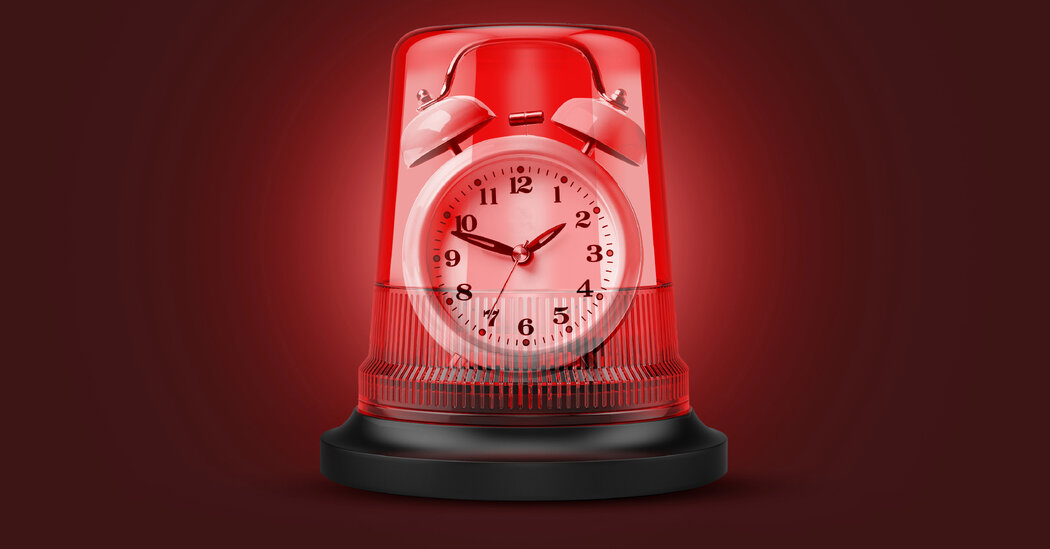For the past few weeks, I’ve been doing a simple experiment: I leave for appointments 10 to 15 minutes earlier than normal.
Yes, this is “obvious” advice, said Chris Guillebeau, the author of the forthcoming book “Time Anxiety: The Illusion of Urgency and a Better Way to Live.” “But the results can be life-changing,” he explained.
Yet people still resist this idea, Guillebeau said: “They get worried, and ask me, ‘What will I do with the extra time?’” But research suggests that people habitually underestimate how long a task will take. “So in reality, they probably won’t have extra time,” Guillebeau said. “They just won’t be late.”
I’m not the only person who has a fraught relationship with the clock. Sixty percent of people surveyed by the Pew Research Center said they sometimes felt too busy to enjoy life.
Some of the stress around scheduling is out of our control, but there are things we can all do to feel more in charge of our time, Guillebeau said. I asked him and other experts for tips.
Abandon the idea that you’ll ever be all caught up.
Your to-do list will never end, said Thomas Curran, an associate professor of psychology at the London School of Economics and Political Science and the author of “The Perfection Trap: Embracing the Power of Good Enough.” So build your tolerance for leaving that list unfinished, he said.
“We end our days obsessing over our unchecked boxes instead of celebrating our wins,” said Amantha Imber, an organizational psychologist and the author of “Time Wise: Powerful Habits, More Time, Greater Joy.” So Dr. Imber recommended completing the sentence “Today I made progress on … ” at each day’s end. Researchers call this practice of reflecting on our past accomplishments a “savoring intervention,” and they say that it can improve confidence.
Dr. Imber also suggested saying, “If I get X done tomorrow, it will be a great day.” Deciding your priority the night before eliminates “the need to deliberate with yourself” in the morning, Dr. Imber explained.
Ask yourself: Is this actually urgent?
Sometimes, Guillebeau said, people can cause you “time anxiety” by pulling you into something they consider urgent, creating a “false deadline.” When this happens, he said, take a beat and ask yourself: Is this actually urgent? Can it wait? Is it urgent to someone else, but not to me?
Another person’s emergency, Guillebeau said, does not have to become yours. A study of work email found that when people sent messages with an urgent tone, the recipients tended to consider the requests urgent — even when they weren’t actually that time-sensitive or important.
If it’s possible, he said, you can ask, “Is this a high priority, or can I finish the other things I’m working on first?”
Consider whether you can bring your B game.
Do you need to bake cookies for your book club, or will store-bought do? Can that Zoom meeting be a quick phone call instead, while you take a reviving walk?
Be alert for those moments when you are needlessly giving it your all and could give, say, 75 percent instead, Guillebeau recommended.
In some cases, he said, “it’s OK to bring your B game.”
It can be harder — and riskier — for some people to do this, said Minda Harts, a workplace consultant and the author of the forthcoming book “Talk to Me Nice: The Seven Trust Languages for a Better Workplace.” “I refer to this as the ‘invisible perfection pressure’ that many people of color feel,” she said.
“Because we’ve historically been told to work twice as hard for half as much, the expectation is that we always bring our A game,” she added. She recommends acknowledging that you’re at capacity by clearly saying, ‘I can’t take this on right now.’
Redefine ‘valuable’ time.
I’m a box checker, and must fight the impulse to squeeze “productivity” out of every moment. But I shouldn’t view downtime as unproductive, Dr. Curran said: “It isn’t wasted at all.”
He sets an alarm for himself that goes off every day at 5:30 p.m. It’s a recording of his toddler asking to play with him.
“It reminds me that whatever I’m doing, it can probably wait,” Dr. Curran said. Often some of your happiest memories will be events that are “mundane and ordinary,” he said, so make time for them if you can.
I recalled Dr. Curran’s words when a friend asked me recently, “If you could relive one day, what would it be?”
It would be a day when my daughter was 4. I had a day off, so we went to a park where we rode on a merry-go-round, followed by a trip to get pizza and ice cream. Then we went home to play Unicorn Land. That’s where you get into bed, put the covers over your head, fling them off, and you’re transformed into a unicorn.
That’s it. It was a mundane and ordinary Tuesday. But I’ll think about that when I’m debating whether to work late or have dinner with my family: I’d do anything to go back to Unicorn Land.
Researchers estimate there is five bottle caps’ worth of plastic in human brains.
A paper published in February found that microplastics are accumulating in our bodies. Human brain samples from 2024, the researchers found, had nearly 50 percent more microplastics than brain samples from 2016. What are the health effects?










